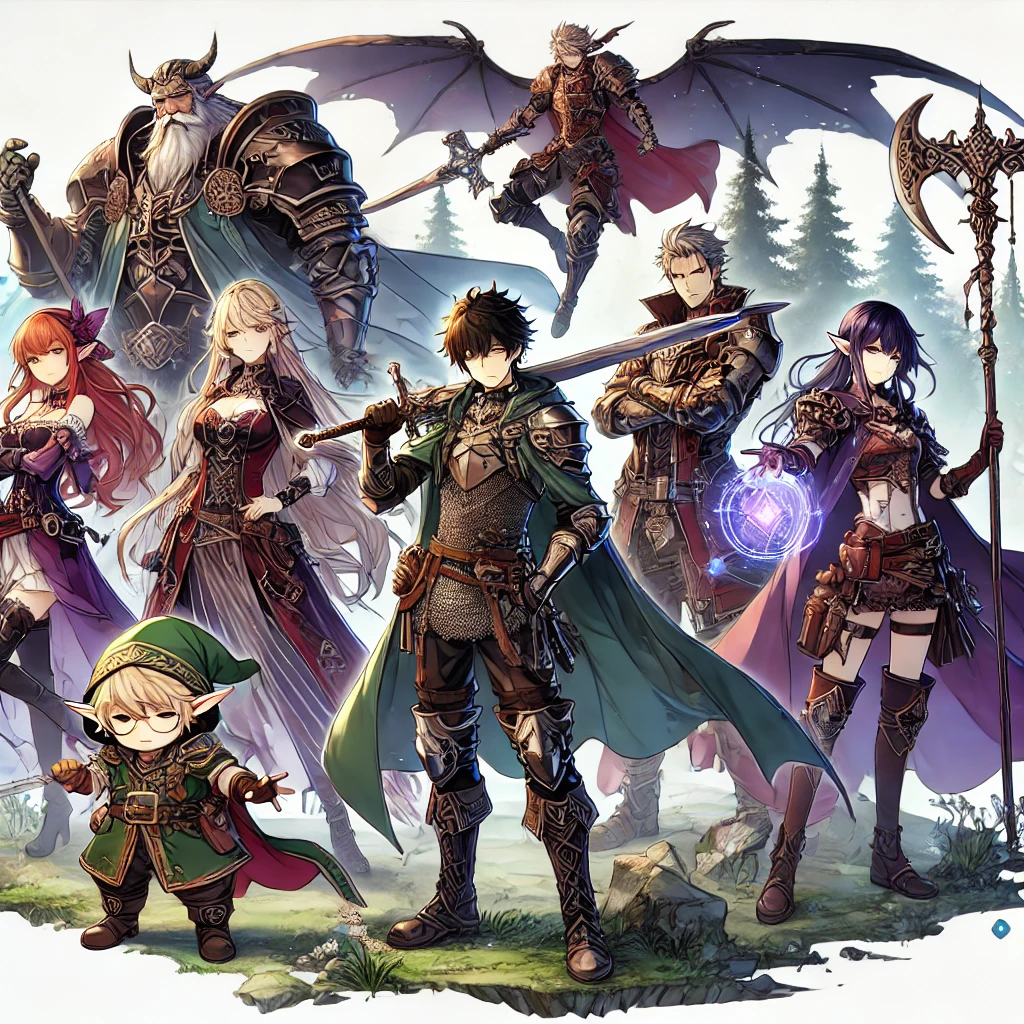Article Structure
- Introduction to KonoSuba: God's Blessing on This Wonderful World! 2
- Provide an overview of the second season, including its release date, production studio, and how it continues from the first season. Highlight the unique blend of humor and fantasy that has made the series a standout in the isekai genre.
- Character Development and Relationships
- Discuss the growth of the main characters—Kazuma, Aqua, Megumin, and Darkness—and how their relationships evolve throughout Season 2. Explore the new characters introduced this season and how they contribute to the dynamic and often chaotic group.
- Plot Overview and Significant Story Arcs
- Outline the main plot of Season 2, focusing on the most significant story arcs, such as the Trial Arc, and Vanir Arc. Discuss how these arcs build on the humor and challenges the characters face.
- Humor and Satire in KonoSuba Season 2
- Explore the comedic elements that define Season 2, including the satire of traditional fantasy tropes and the subversion of isekai genre conventions. Discuss how the humor not only entertains but also deepens the characters and storylines.
- Impact on the Isekai Genre and Fan Reception
- Analyze the impact of KonoSuba Season 2 on the isekai genre, highlighting its influence on similar series and its contribution to the popularity of comedic fantasy. Discuss fan reception, awards, and the series’ lasting legacy within the anime community.
Contents
Introduction to KonoSuba: God's Blessing on This Wonderful World! 2

"KonoSuba: God's Blessing on This Wonderful World! 2" is the highly anticipated second season of the hit anime series that continues to captivate fans with its perfect blend of humor and fantasy. Released in January 2017 and produced by Studio Deen, this season picks up right where the first left off, plunging viewers back into the chaotic and hilarious adventures of Kazuma Satou and his eccentric party.
The story follows Kazuma, a once ordinary NEET who was transported to a fantasy world after an untimely and somewhat embarrassing death. In this new world, Kazuma teams up with a ragtag group of adventurers: Aqua, a goddess who is as useless as she is beautiful; Megumin, a powerful mage who can only cast one explosive spell per day; and Darkness, a masochistic crusader with an unusual love for punishment. Together, they continue their quest for fortune, fame, and the occasional bit of heroism, though more often than not, their efforts lead to disaster rather than success.
What sets "KonoSuba: God's Blessing on This Wonderful World! 2" apart in the crowded isekai genre is its unique approach to humor. Unlike many other fantasy series that focus on epic battles and grand quests, KonoSuba delights in subverting these tropes with a heavy dose of comedy. The series takes the typical elements of isekai—overpowered heroes, legendary quests, and magical worlds—and turns them on their head, opting instead for a more lighthearted and often irreverent take on the genre.
Season 2 continues this trend by building on the established chemistry of the main cast. The dysfunctional dynamics between Kazuma and his party members remain the heart of the show, with each character’s quirks and flaws driving the comedy forward. Whether it’s Aqua’s constant blunders, Megumin’s obsession with explosion magic, or Darkness’s love for masochistic combat, the series consistently delivers laughs while exploring the absurdities of life in a fantasy world.
In addition to its humor, KonoSuba Season 2 also offers a rich visual experience. Studio Deen’s animation brings the fantasy world to life with vibrant colors, expressive character designs, and dynamic action sequences that enhance both the comedic and fantasy elements of the show. The voice acting is another highlight, with Jun Fukushima (Kazuma), Sora Amamiya (Aqua), Rie Takahashi (Megumin), and Ai Kayano (Darkness) delivering performances that perfectly capture the chaotic energy of their characters.
Overall, "KonoSuba: God's Blessing on This Wonderful World! 2" is a standout in the isekai genre, thanks to its unique blend of humor, fantasy, and memorable characters. The second season not only continues the misadventures of Kazuma and his team but also deepens the bonds between them, offering fans more of the hilarious and heartfelt moments that made the first season a hit. Whether you’re new to the series or a longtime fan, Season 2 of KonoSuba is sure to entertain with its sharp wit, lovable characters, and endless charm.
Character Development and Relationships

In "KonoSuba: God's Blessing on This Wonderful World! 2," the growth of the main characters—Kazuma, Aqua, Megumin, and Darkness—is central to the season’s appeal. While the series is known for its humor, Season 2 delves deeper into the personalities and relationships of these eccentric adventurers, adding layers to their interactions that go beyond mere comedy.
Kazuma Satou, the pragmatic yet unlucky protagonist, continues to develop as he navigates the challenges of this fantasy world. Throughout Season 2, Kazuma’s quick wit and resourcefulness are put to the test as he faces increasingly absurd situations. Despite his cynical outlook, Kazuma’s loyalty to his party members deepens, revealing a more compassionate side to his character. His relationship with each member of his party grows more complex, particularly as he begins to recognize the strengths that lie beneath their flaws.
Aqua, the self-proclaimed goddess who is more trouble than she’s worth, also sees some growth this season. Though she remains as vain and clueless as ever, Aqua’s moments of vulnerability add depth to her character. Her reliance on Kazuma and the rest of the team becomes more apparent, highlighting a bond that, despite all odds, strengthens over time. Aqua’s comedic missteps continue to be a source of laughter, but Season 2 also shows her growing realization that she is not as all-powerful as she once believed.
Megumin, the explosion-obsessed mage, further cements her place as one of the series’ most beloved characters. Season 2 provides more insight into Megumin’s backstory, including her reasons for choosing such a self-limiting form of magic. Her relationship with Kazuma evolves, with subtle hints of deeper feelings that add an intriguing layer to their dynamic. Megumin’s loyalty to her chosen magic and her team never wavers, even as the consequences of her decisions lead to more chaos.
Darkness, the masochistic crusader with a noble lineage, continues to grapple with her conflicting desires. Season 2 gives Darkness more opportunities to shine, particularly as her background is explored in greater detail. Her unwavering commitment to her ideals, even when they lead to personal discomfort, adds both humor and heart to the series. Darkness’s interactions with Kazuma and the others reveal a character who is far more than just a comedic foil; she is someone driven by a deep sense of duty and loyalty.
Season 2 also introduces new characters who add to the already chaotic dynamic of Kazuma’s party. Yunyun, Megumin’s self-proclaimed rival, makes her appearance as a shy yet powerful mage. Her interactions with the group, especially with Megumin, provide both comedic moments and a different perspective on the Crimson Demon clan. Yunyun’s desire for friendship contrasts with the more assertive personalities of the main cast, offering a fresh dynamic that enriches the story.
Another notable addition is Vanir, a demon with a flair for the dramatic and a sharp tongue. Vanir’s complex relationship with the group, particularly his business dealings with Wiz, adds a new layer of intrigue and humor to the series. His interactions with Kazuma showcase a battle of wits that is both entertaining and revealing, further complicating the team’s already convoluted quest for success.
In conclusion, "KonoSuba: God's Blessing on This Wonderful World! 2" deepens the character development of its main cast while introducing new characters who contribute to the series’ dynamic and often chaotic nature. The evolving relationships between Kazuma, Aqua, Megumin, and Darkness add emotional depth to the humor, making Season 2 a richly entertaining continuation of the series.
Plot Overview and Significant Story Arcs

"KonoSuba: God's Blessing on This Wonderful World! 2" continues to deliver the chaotic and humorous adventures of Kazuma Satou and his dysfunctional party. The second season picks up right where the first left off, with Kazuma and his team facing a new series of challenges that test their wits, abilities, and, most importantly, their patience with one another.
The Trial Arc is one of the most significant story arcs in Season 2, setting the tone for the series’ blend of comedy and absurdity. The arc begins with Kazuma being arrested and put on trial for treason after accidentally destroying a noble’s mansion at the end of the first season. This arc is a perfect showcase of Kazuma’s quick thinking and the unintentional chaos caused by his party members, especially Aqua. The courtroom drama is filled with comedic moments as Kazuma desperately tries to clear his name, only to be repeatedly undermined by the antics of his so-called allies. The Trial Arc not only builds on the humor established in the first season but also highlights the ongoing challenges Kazuma faces in trying to adapt to his new life in this unpredictable world.
Another major storyline in Season 2 is the Vanir Arc, which introduces Vanir, a powerful demon with a penchant for sarcasm and a unique sense of humor. Vanir quickly becomes a fan-favorite character due to his sharp wit and the intriguing dynamic he brings to the group. The arc revolves around Kazuma’s dealings with Vanir, who, despite being a demon, forms an unlikely business partnership with the group. The interactions between Vanir and Kazuma are particularly entertaining, showcasing a battle of wits that adds a new layer of humor to the series.
Throughout the Vanir Arc, the series continues to blend its comedic elements with moments of genuine tension and action. Vanir’s presence forces Kazuma and his team to confront challenges that are both physical and mental, pushing the characters to their limits in the most ridiculous ways possible. The arc also explores the idea that not everything in this fantasy world is as black-and-white as it seems, with Vanir’s complex motivations adding depth to the story.
These story arcs are central to the development of "KonoSuba: God's Blessing on This Wonderful World! 2," as they build on the humor and challenges that the characters face in their quest for fortune and glory. Kazuma’s interactions with the legal system, the nobles, and the demons all contribute to the series’ ongoing theme of subverting traditional fantasy tropes. Rather than focusing on epic battles and heroic quests, KonoSuba takes a more irreverent approach, finding humor in the mundane and the absurd.
In addition to these major arcs, Season 2 continues to explore the everyday misadventures of Kazuma and his team, from botched quests to encounters with eccentric townsfolk. Each episode is packed with moments that highlight the characters’ flaws and strengths, all while delivering the kind of humor that has made KonoSuba a standout in the isekai genre.
In conclusion, the Trial Arc and Vanir Arc are two of the most significant storylines in "KonoSuba: God's Blessing on This Wonderful World! 2." These arcs not only build on the humor and challenges that define the series but also introduce new characters and dynamics that keep the story fresh and engaging. Through these arcs, the second season of KonoSuba continues to entertain with its unique blend of comedy, fantasy, and the enduring misadventures of Kazuma and his team.
Humor and Satire in KonoSuba Season 2

"KonoSuba: God's Blessing on This Wonderful World! 2" is a masterclass in blending humor with fantasy, standing out for its unique ability to both entertain and subtly critique the conventions of the isekai genre. Season 2 continues to build on the comedic foundation laid by its predecessor, delivering a series of episodes that are as hilarious as they are insightful.
One of the defining elements of KonoSuba’s humor is its satire of traditional fantasy tropes. Unlike typical fantasy series that glorify heroism and epic quests, KonoSuba takes a more grounded and irreverent approach. The characters, far from being noble or heroic, are flawed individuals with selfish motivations and questionable abilities. Kazuma, the protagonist, is a self-proclaimed NEET who prefers comfort over adventure. Aqua, the so-called goddess, is more concerned with her own vanity than with helping others. Megumin and Darkness, while powerful in their own right, are driven by obsessions that often hinder more than help the group’s efforts.
Season 2 amplifies this satirical take, particularly in the way it subverts the expectations of the isekai genre. Traditional isekai narratives often feature protagonists who quickly adapt to their new worlds, becoming powerful figures who lead grand adventures. KonoSuba, however, flips this on its head by focusing on the mundane struggles of everyday life in a fantasy world. Whether it’s dealing with legal troubles, battling a giant snowman, or simply trying to make ends meet, Kazuma and his party face challenges that are more comedic than heroic.
The humor in KonoSuba is not just for laughs; it also serves to deepen the characters and their storylines. The interactions between Kazuma and his companions are laced with sarcasm, irony, and playful banter, which not only highlights their unique personalities but also strengthens the bonds between them. Through their shared misadventures, we see Kazuma’s growing (albeit reluctant) affection for his team, Aqua’s moments of vulnerability, Megumin’s unyielding passion for explosions, and Darkness’s unwavering loyalty, despite her eccentricities.
Season 2 also uses humor to explore the theme of incompetence. The characters’ frequent failures and misunderstandings are a source of endless comedy, but they also reveal deeper truths about their personalities. For example, Kazuma’s attempts to take shortcuts often backfire, leading to even more complicated situations. Aqua’s overconfidence consistently lands her in trouble, while Megumin’s obsession with explosion magic limits her usefulness in battle. These flaws, while exaggerated for comedic effect, make the characters more relatable and endearing.
The subversion of genre conventions extends to the series’ portrayal of villains and conflicts. Rather than facing purely evil antagonists, Kazuma and his team often encounter foes who are just as flawed and humorous as they are. The introduction of Vanir, a demon who becomes an unexpected ally, adds a layer of complexity to the story. Vanir’s sharp wit and sarcastic demeanor mirror Kazuma’s own, creating a dynamic that is both entertaining and thought-provoking.
Overall, the humor in "KonoSuba: God's Blessing on This Wonderful World! 2" does more than just entertain—it enhances the narrative by adding depth to the characters and offering a fresh take on the isekai genre. The series’ ability to balance satire with genuine character development is what makes it stand out among other fantasy anime. By poking fun at the conventions of its genre, KonoSuba invites viewers to laugh not just at the absurdity of the characters’ situations, but also at the broader tropes that define isekai storytelling.
In conclusion, the comedic elements in Season 2 of KonoSuba are integral to its charm and success. Through its clever satire and subversion of fantasy tropes, the series not only entertains but also provides a unique commentary on the genre, all while deepening the connection between its characters and its audience.
Impact on the Isekai Genre and Fan Reception

"KonoSuba: God's Blessing on This Wonderful World! 2" has left an indelible mark on the isekai genre, standing out for its unique blend of humor and fantasy. While the isekai genre is known for its serious and often grandiose narratives, KonoSuba’s irreverent approach has set a new standard, proving that comedy can be just as powerful in storytelling. Season 2, in particular, solidified the series’ reputation, influencing a wave of similar anime that sought to replicate its success.
The impact of KonoSuba on the isekai genre can be seen in how it has inspired other series to embrace comedic elements. Traditionally, isekai stories revolve around epic quests and heroic protagonists. However, KonoSuba’s focus on flawed, relatable characters who struggle with everyday challenges in a fantasy world has resonated with audiences and creators alike. The series’ ability to subvert genre conventions—turning typical isekai tropes on their head—has encouraged other anime to explore humor and satire within their narratives. This shift towards comedic fantasy has broadened the genre, making it more accessible and diverse.
KonoSuba’s influence extends beyond just its storytelling approach. The series has also contributed to the popularity of lighthearted and character-driven narratives in anime. By prioritizing character interactions and personal growth over epic battles, KonoSuba has shown that even in a fantastical setting, the most compelling stories often come from the relationships between characters. This focus on character dynamics, paired with the series’ sharp humor, has become a hallmark of modern isekai anime.
Fan reception of KonoSuba Season 2 was overwhelmingly positive. The continuation of Kazuma and his party’s misadventures was eagerly anticipated, and the season did not disappoint. Fans praised the series for its consistent humor, engaging storylines, and character development. The chemistry between the main characters—Kazuma, Aqua, Megumin, and Darkness—remained a highlight, with their interactions providing both comedic gold and moments of genuine emotion.
In terms of accolades, KonoSuba has received various awards and nominations, further cementing its place as a standout in the anime industry. While specific awards for Season 2 may vary, the series as a whole has been recognized for its originality, writing, and voice acting. The series’ success is also reflected in its strong and loyal fanbase, which has continued to grow since its release. The enduring popularity of KonoSuba is a testament to its ability to entertain and connect with viewers on a deeper level, beyond just its comedic exterior.
The legacy of KonoSuba within the anime community is significant. The series has not only shaped the direction of the isekai genre but also left a lasting impression on how comedy can be effectively integrated into fantasy storytelling. Its influence is evident in the numerous anime that have followed in its footsteps, embracing a similar tone and approach to character-driven humor. Moreover, KonoSuba’s ability to balance satire with genuine character development has made it a beloved series that continues to be celebrated by fans and critics alike.
In conclusion, "KonoSuba: God's Blessing on This Wonderful World! 2" has had a profound impact on the isekai genre and the broader anime community. Its influence on comedic fantasy and its contribution to the genre’s evolution are undeniable. With its strong fan reception and lasting legacy, KonoSuba has secured its place as one of the most iconic and influential anime series of its time.



